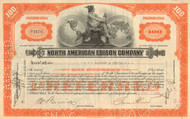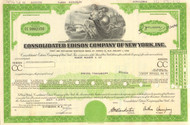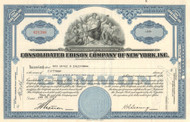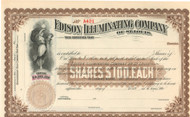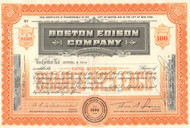Categories
Categories
- Home
- Communication and Utilities
- Utilities
- Con Edison - Consolidated Edison Company of New York 1970's
Con Edison - Consolidated Edison Company of New York 1970's
Product Description
Consolidated Edison Company of New York stock certificate 1970's
Beautiful Con Ed stock certificate with amazing vignette of utilities worker in front of the New York skyline and a power plant. Eerie images of a jet plane and the twin towers in the background. Issued and cancelled in the 1970's
Consolidated Edison, Inc., commonly known as Con Edison or Con Ed, is one of the largest investor-owned energy companies in the United States, with approximately $13 billion in annual revenues as of 2010, and over $36 billion in assets. The company provides a wide range of energy-related products and services to its customers through its subsidiaries:
Consolidated Edison Company of New York, Inc., a regulated utility providing electric, gas, and steam service in New York City and Westchester County, New York;
Orange and Rockland Utilities, Inc., a regulated utility serving southeastern New York and adjacent sections of northern New Jersey and northeastern Pennsylvania;
Con Edison Solutions, a retail energy supply and services company;
Con Edison Energy, a wholesale energy supply company;
Con Edison Development, a company that owns and operates generating plants and participates in other infrastructure projects.
In 1823, Con Edison’s earliest corporate predecessor, the New York Gas Light Company, was founded by a consortium of New York City investors. A year later, it was listed on the New York Stock Exchange. In 1884, six gas companies combined into the Consolidated Gas Company. The New York Steam Company began providing service in lower Manhattan in 1882. Today, Con Edison operates the largest commercial steam system in the world, providing steam service to nearly 1,600 commercial and residential establishments in Manhattan from Battery Park to 96th Street.
Con Edison’s electric business also dates back to 1882, when Thomas Edison’s Edison Illuminating Company of New York began supplying electricity to 59 customers in a square-mile area in lower Manhattan. After the “War of Currents”, there were more than 30 companies generating and distributing electricity in New York City and Westchester County. But by 1920 there were far fewer, and the New York Edison Company was clearly the leader.
In 1936, with electric sales far outstripping gas sales, the company incorporated and the name was changed to Consolidated Edison Company of New York, Inc. The years that followed brought further amalgamations as Consolidated Edison acquired or merged with more than a dozen companies between 1936 and 1960. Con Edison today is the result of acquisitions, dissolutions and mergers of more than 170 individual electric, gas and steam companies.
On January 1, 1998, following the deregulation of the utility industry in New York state, a holding company, Consolidated Edison, Inc., was formed. It is one of the nation’s largest investor-owned energy companies, with approximately $14 billion in annual revenues and $33 billion in assets. The company provides a wide range of energy-related products and services to its customers through two regulated utility subsidiaries and three competitive energy businesses. Under a number of corporate names, the company has been traded on the NYSE without interruption since 1824—longer than any other NYSE stock. Its largest subsidiary, Consolidated Edison Company of New York, Inc. provides electric, gas and steam service to more than 3 million customers in New York City and Westchester County, New York, an area of 660 square miles with a population of nearly 9 million.
The 93,000 miles of underground cable in the Con Edison system could wrap around the Earth 3.6 times. Nearly 36,000 miles of overhead electric wires complement the underground system—enough cable to stretch between New York and Los Angeles 13 times. The Con Edison gas system has nearly 7,200 miles of pipes—if laid end to end, long enough to reach Paris and back to New York City, and serves Westchester County, the Bronx, Manhattan and parts of Queens. Gas service in the other boroughs is provided by National Grid USA. The average volume of gas that travels through Con Edison’s gas system annually could fill the Empire State Building nearly 6,100 times.
Con Edison produces 30 billion pounds of steam each year through its seven power plants which boil water to 1,000 °F before pumping it to hundreds of buildings in the New York City steam system, which is the biggest district steam system in the world. Steam traveling through the system is used to heat and cool some of New York’s most famous addresses, including the United Nations complex, the Empire State Building, and the Metropolitan Museum of Art.
The Consolidated Edison Company Building, designed by Henry J. Hardenbergh, was built between 1910 and 1914. The building, at 4 Irving Place, takes up the entire block between East 14th and 15th Streets and Irving Place and Third Avenue, and was originally built for the Consolidated Gas Company, although its predecessor companies, such as the Manhattan Gas Light Company, were located at the same address as early as 1854. The new building's location had been the site of the Academy of Music, New York's third opera house, as well as the original Tammany Hall building.
Warren & Wetmore's 26-story tower - topped by a "Tower of Light" designed to look like a miniature temple and capped by a bronze lantern which lights up at night - was added between 1926 and 1929.
 Loading... Please wait...
Loading... Please wait... 



